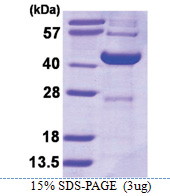DCPS (1-337, His-tag) Human Protein
Other products for "DCPS"
Specifications
| Product Data | |
| Species | Human |
| Expression Host | E. coli |
| Expression cDNA Clone or AA Sequence |
MGSSHHHHHH SSGLVPRGSH MADAAPQLGK RKRELDVEEA HAASTEEKEA GVGNGTCAPV RLPFSGFRLQ KVLRESARDK IIFLHGKVNE ASGDGDGEDA VVILEKTPFQ VEQVAQLLTG SPELQLQFSN DIYSTYHLFP PRQLNDVKTT VVYPATEKHL QKYLRQDLRL IRETGDDYRN ITLPHLESQS LSIQWVYNIL DKKAEADRIV FENPDPSDGF VLIPDLKWNQ QQLDDLYLIA ICHRRGIRSL RDLTPEHLPL LRNILHQGQE AILQRYRMKG DHLRVYLHYL PSYYHLHVHF TALGFEAPGS GVERAHLLAE VIENLECDPR HYQQRTLTFA LRADDPLLKL LQEAQQS
|
| Tag | His-tag |
| Predicted MW | 40.8 kDa |
| Concentration | lot specific |
| Purity | >90% |
| Presentation | Purified |
| Buffer | Presentation State: Purified State: Liquid purified protein Buffer System: 20 mM Tris-HCl buffer (pH 8.0) containing 20% glycerol, 1 mM DTT |
| Preparation | Liquid purified protein |
| Protein Description | Recombinant human DCPS protein, fused to His-tag at N-terminus, was expressed in E.coli and purified by using conventional chromatography. |
| Storage | Store undiluted at 2-8°C for up to two weeks or (in aliquots) at -20°C or -70°C for longer. Avoid repeated freezing and thawing. |
| Stability | Shelf life: one year from despatch. |
| Reference Data | |
| RefSeq | NP_001337165 |
| Locus ID | 28960 |
| Cytogenetics | 11q24.2 |
| Synonyms | ARS; DCS1; HINT-5; HINT5; HSL1; HSPC015 |
| Summary | This gene encodes a member of the histidine triad family of pyrophosphatases that removes short mRNA fragments containing the 5′ mRNA cap structure, which appear in the 3′ → 5′ mRNA decay pathway, following deadenylation and exosome-mediated turnover. This enzyme hydrolyzes the triphosphate linkage of the cap structure (7-methylguanosine nucleoside triphosphate) to yield 7-methylguanosine monophosphate and nucleoside diphosphate. It protects the cell from the potentially toxic accumulation of these short, capped mRNA fragments, and regulates the activity of other cap-binding proteins, which are inhibited by their accumulation. It also acts as a transcript-specific modulator of pre-mRNA splicing and microRNA turnover. [provided by RefSeq, Apr 2017] |
| Protein Pathways | RNA degradation |
Documents
| FAQs |
| SDS |
Resources
Recombinant Protein Resources |
{0} Product Review(s)
0 Product Review(s)
Submit review
Be the first one to submit a review
Product Citations
*Delivery time may vary from web posted schedule. Occasional delays may occur due to unforeseen
complexities in the preparation of your product. International customers may expect an additional 1-2 weeks
in shipping.






























































































































































































































































 Germany
Germany
 Japan
Japan
 United Kingdom
United Kingdom
 China
China
